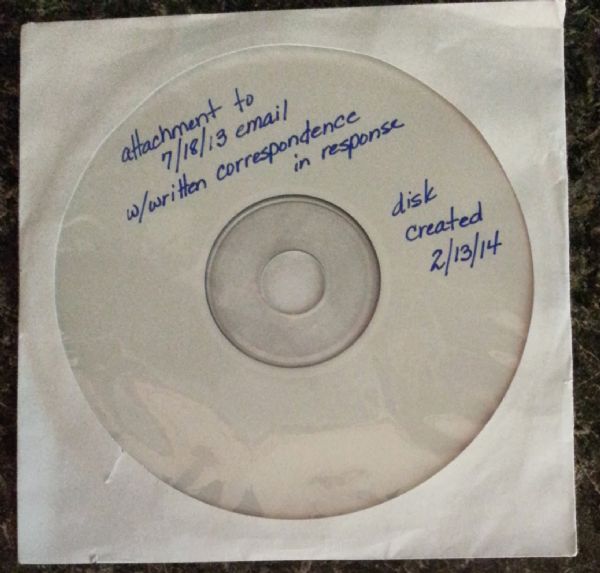|
The Audit Files: Part 1
Docs turned over in public records lawsuit show deeper involvement by Brock, staff in audit
More than 300 pages of key documents surface after Brock’s office said all public records turned over
April 22, 2014
By Gina Edwards
Naples City Desk
|

This archive story is now free.
You support the work of the journalist who produced this story when you subscribe to Naples City Desk for only $4.99 a month.
Browse Archive Headlines
Subscribe
|
Clerk of Courts Dwight Brock, the county’s independently elected auditor, told Collier County commissioners in January that he chose to stay out of an audit of his 2012 political opponent and that he hired an “independent auditor” to avoid the appearance of impropriety.
“In order for me to avoid even so much as the appearance of impropriety, I chose to stay out of the process and hire a purely independent auditor to review it,” Brock told Collier County commissioners when he presented them with a report by the firm Clifton Larson Allen at their Jan. 14 meeting.
Brock didn’t stay out of the process, based on a review by Naples City Desk of hundreds of pages of internal documents.
The batch of documents provided by Brock in response to a public records lawsuit by Naples City Desk includes 6 additional draft reports — spanning almost 300 pages and produced from July through November — and approximately 2 dozen emails that reflect even more extensive input and revisions by Brock’s staff of consultant Clifton Larson Allen’s report than was previously revealed in public records provided to this reporter in response to a Jan. 17 public records request.
|
Getting the public records:
The back story
Following an interview of Clerk of Courts Dwight Brock on Jan. 17, this reporter made a public records request to inspect the H.O.M.E. audit work papers, or the supporting background files, of the work. These papers become public record after an audit is officially released, which Brock did at the Jan. 14 Commission meeting.
 After allowing an initial inspection of 5 binders of H.O.M.E. audit work papers on Jan. 22, Brock’s Community Outreach Director Robert St. Cyr ended the inspection after 3.5 hours and refused to allow this reporter to get paper copies of certain documents that day. After allowing an initial inspection of 5 binders of H.O.M.E. audit work papers on Jan. 22, Brock’s Community Outreach Director Robert St. Cyr ended the inspection after 3.5 hours and refused to allow this reporter to get paper copies of certain documents that day.
The next day, he then sought to delay further access to the set of documents to the following week. This reporter, in an email, protested the delayed access to the public records, including the ones paper clipped for copies the day before, saying the audit work papers were of keen interest to the public and press. St. Cyr said most of the pages marked for copy were already available as scanned versions.
Late that day, Brock’s office provided a CD for $1 and said all the pages this reporter had marked during inspection were included as scanned documents. This reporter was told by Senior Internal Auditor Ron Dortch that the office policy is that for scanned documents, the first two hours of staff time are free and that the office also charges a $1 cost for the CD.
The next day, Brock’s office agreed to provide more than 1,000 pages of scanned electronic documents on a CD, for a charge of $1, and represented in an email that all 5 binders of documents were included, so no further physical inspection of the binders by this reporter was needed.
As required by Brock, this reporter emailed interview questions in writing that day, including a question about a Clifton Larson Allen meeting memo that described Finance Director Crystal Kinzel directing the consultant to include houses that were paid for entirely with private funds into profit calculations. This reporter had snapped a picture of the document with a smart phone at the initial document inspection and attached the photo to the questions.
Late that day, a Friday, when this reporter picked up the CD from Brock’s office, the two binders of Clifton Larson Allen documents were missing. Three days later Brock’s staff emailed more than 460 pages of Clifton Larson Allen documents and said the documents weren’t included as promised because there was a miscommunication among staff.
Two days later, on Jan. 29, Brock’s staff had not answered any of the follow-up questions that St. Cyr asked to be submitted in writing.
“You have all of the Clerk’s public records related to the H.O.M.E audit, including the work done by the independent CPA firm Clifton Larson Allen… In summary, we believe the H.O.M.E. audits reports and work papers speak for themselves and do not warrant further comment from the Clerk,” St. Cyr wrote in an email.
One of the questions asked about how much the consultant’s report had cost. In the absence of a response, this reporter made a public records request for a copy of checks paid to Clifton Larson Allen.
In response, St. Cyr said: “If the public records you have requested are available in an electronic format, and it requires minimal staff time to burn a CD, or to send an attachment via email, the charge is $1.00/ CD.” He subsequently sent a scanned copy of the check.
 This reporter remembered noticing a significant number of appraisal reports showing remodeling in the audit work papers and marking them for copies at the initial document inspection on Jan. 22. Later when Brock’s office provided scanned electronic documents, including supposedly all the files, the appraisal reports showing the remodeled houses weren’t there, except for two of them. This reporter remembered noticing a significant number of appraisal reports showing remodeling in the audit work papers and marking them for copies at the initial document inspection on Jan. 22. Later when Brock’s office provided scanned electronic documents, including supposedly all the files, the appraisal reports showing the remodeled houses weren’t there, except for two of them.
This reporter asked about the missing appraisals in a Feb. 4 email and also asked why H.O.M.E.’s original grant application wasn’t included in the scanned documents provided because the application was in the original binders inspected. St.Cyr then sent a copy of the H.O.M.E. grant application by email.
A spokesman for Brock’s office said no one had tampered with the audit work paper binders or removed appraisal reports. This reporter re-inspected the binders on Feb. 6 and didn’t find the appraisals. At that time Brock’s office produced six binders for review, including an extra binder with 2008 documents including heated correspondence between Kinzel and Barlow. This reporter told Brock’s office that she remembered reviewing the appraisal documents in the binders, but that she had no definitive proof they were there.
An attorney for H.O.M.E. subsequently provided copies of the appraisal reports for the houses at this Naples City Desk reporter’s request.
The appraisal reports included photos of the houses that showed extensive remodeling work and written notes of the appraiser documenting the remodeling — contradicting Brock’s public allegations that he couldn’t substantiate that $410,000 in remodeling work billed by H.O.M.E.’s contractor was done. In the original set of audit work papers produced by Brock’s office a handwritten note by Brock’s internal auditor documents that she had reviewed the appraisals for the remodeled houses for her 2012 audit, which closed without major findings.
This reporter followed up with Brock’s office on Feb. 7 to request a scanned copy of a July 17 draft report by Clifton Larson Allen that was referenced in the audit work papers but not provided in response to the original public records request. A scanned copy of Brock’s audit policies and procedures were also requested at that time. This reporter also asked if there were additional documents that reflected why the decision was made to re-open the audit because there were no documents in the files from Brock’s staff requesting that the H.O.M.E. audit be re-opened. Brock’s office did not respond to that question nor to questions about his audit department including a question as to whether Kinzel was the Internal Audit Director.
Naples City Desk published stories on Feb. 11 and Brock’s office later sought to charge $556, or $1 per page, for scanned electronic public records on 2 CDs on Feb. 13. Naples City Desk asked Brock to reconsider the fee, saying the documents sought were not court records, but county records created in Brock’s role as clerk and accountant to the Board of County Commissioners. According to the 2013 Government-in-the-Sunshine Manual (p. 167), two attorney general opinions have found that the Clerk of Courts must charge the rate in line with the public records act for these type of records, or 15 cents for printed pages or the actual cost of duplication for electronic records.
Brock’s office sent a “2nd Notice” email about the fees and responded by asking if this reporter was refusing to pay.
Naples City Desk filed a public records lawsuit against Brock on Feb. 25. challenging the fees.
In response to the lawsuit, Brock contended that as Clerk of Courts he is not subject to the fee provisions of the Florida public records law and that the statute governing court clerks enables him to charge up to $1 per page for any documents in his possession.
Brock has broad responsibilities as Clerk for not only keeping court records, officials records like deeds and mortgages and liens, but also for serving as accountant and custodian of all county money and holding all the county’s financial records.
Naples City Desk contended that Brock can only charge the actual cost of duplication for electronic records and that the records in question are county records produced pursuant to his role as clerk and accountant to the board of county commissioners. Those records should be available to the public for 15 cents a page for printed copies or for the actual cost of duplication for electronic records, which is typically the cost of a CD.
Naples City Desk requested an emergency hearing to so as not to slow down reporting and obtain the records without delay. Brock agreed to provide the 556 pages of electronic documents and suspend charges until the court decided an appropriate fee.

Approximately 300 pages of the records include 6 more report drafts from Clifton Larson Allen, raising questions as to why these weren’t produced in response to the original Jan. 17 public records request. The pages also contradict Brock’s office in the Jan. 29 email that said: “You have all of the Clerk’s public records related to the H.O.M.E audit, including the work done by the independent CPA firm Clifton Larson Allen.”
In a March 26 ruling, Collier Circuit Judge Fred Hardt struck down the $556 fee and said Brock could charge $2, or the cost of two CDs, for the electronic records. Hardt ruled that even the statute governing court clerks cited by Brock requires a clerk to comply with the public records act fee schedule for documents in an electronic database.
Brock challenged Hardt’s ruling in court filings on April 7, saying that the scanned documents did not exist in an electronic database and that this reporter should be required to prove at a trial that a “scanned copy” of a document is an “electronic copy of information contained in a computer database.”
In addition, Brock asserts in court papers that the 206 pages of audit policies and procedures “only existed in hard paper form and not in any electronic format at the time that Edwards made her request.”
Many of the pages are dated in 2013. Naples City Desk has argued in court papers that if the records already existed in an electronic medium when the request was made, then Brock’s office had a duty to provide the records electronically for the actual cost of duplication. If the records did not exist electronically, then Brock was not required to produce electronic records, but by electing to do so his office was required to charge a fee in line with the public records law governing electronic records.
Judge Hardt granted Brock’s request for a trial and has set a date for May 27.
— Gina Edwards
For Naples City Desk
|
And the documents add detail about Brock’s personal reviews, which reference reviews by Brock of at least two report drafts. A Nov. 5 email suggests that Brock would make the call on whether his 2012 political opponent, John Barlow, would have an opportunity to review the final report before it went public.
“Here is the draft report dated today … Once Dwight reviews, let me know what he decides on how to handle John Barlow’s request to review the latest updated draft before it goes final,” the Nov. 5 email from Clifton Larson Allen’s Andrew Laflin to Brock’s Finance Director Crystal Kinzel says. Barlow wasn’t allowed to review the final report, but he did meet with the consultant and Brock’s staff and review a preliminary draft in October.
Professional standards for auditors offer warnings against engaging in audits where conflicts of interests are present and threaten objectivity. Industry professionals say auditing a political opponent is a clear violation.
As Steve Goodson, a Texas auditor who sits on the national education and research committee for the Institute of Internal Auditors told Naples City Desk: “I would think it would be nearly impossible for an auditor to be objective regarding someone he’s run against in a political race.”
Barlow, a retired auto glass industry CEO, ran unsuccessfully against Brock for Clerk of Courts in 2012. Brock, an attorney and CPA, has served as Clerk of Courts since 1992.
For example, in an Aug. 1 email with the subject line “H.O.M.E. supporting documents”, Clifton Larson Allen’s Laflin writes: “Hi Crystal and Ron – I finished making the additions/updates to our consulting report that Crystal and I had discussed on our last call. The changes are just finishing up getting reviewed and we should have a revised draft for you shortly.”
During his televised public presentation, Brock repeatedly referred to Clifton Larson Allen as an independent auditor and he repeatedly called the firm’s report an audit. But Clifton Larson Allen made clear in its engagement letter that the firm was hired as a consultant. Firm employees took direction from Brock’s top lieutenant, Finance Director Kinzel, and documents show Brock also weighed in on Clifton Larson Allen’s report.
Barlow’s attorney, Jeff Fridkin, says Brock and Commission ally Georgia Hiller misleadingly called the Clifton Larson Allen report an independent audit to give credence to false and malicious allegations by Brock that Barlow and the charity he founded called H.O.M.E. had committed misconduct in connection with a 2008 federal affordable housing grant.
Brock, in his official capacity as the county’s elected auditor, said he planned to go to law enforcement with his findings . In a Jan. 17 interview, he said he isn’t engaging in witch hunts and that anyone receiving taxpayer money should expect significant scrutiny from his office.
Barlow’s lawyers say this: After earlier closing an audit in 2012, Brock re-opened an audit as part of a political payback to trump up false and malicious allegations and smear H.O.M.E’s volunteer board members. H.O.M.E. board members included Hiller’s 2010 political opponent, Gina Downs, and high-profile and politically influential business leaders including Greater Naples Chamber of Commerce past president Russell Budd, and economic development chair Julie Schmelzle and Mel Engel, the president of the large commercial builder Boran Craig Barber & Engel.
A Naples City Desk investigation that examined hundreds of pages of deeds, mortgages, building permits and Brock’s internal work papers, found that Brock made misleading statements and allegations about H.O.M.E.
Meeting memos show Kinzel directed Clifton Larson Allen to add houses that received no federal grant dollars, thereby skewing grant profit calculations against H.O.M.E..In addition, she misrepresented that H.O.M.E. used profits on federal grant money to buy 6 houses, when in reality H.O.M.E. used all private money to buy them.
The proportion of private money H.O.M.E. contributed to the project, most of it personally financed by Barlow, meant H.O.M.E. didn’t owe back grant profits to Collier County under federal formulas. A county budget analyst opined in 2011 that H.O.M.E. didn’t owe back program profits because of federal formulas that give credit for private money.
Kinzel’s role in Brock’s office as both Internal Audit Director and Finance Director is unusual and violates widely accepted industry and government auditing standards. In simple terms, auditors can’t objectively audit day-to-day operations they’ve been involved in.
Documents show Kinzel personally reviewed sign offs by her staff on H.O.M.E. grant payments, gave input on the H.O.M.E. contract structure and urged staff to pull off the Board of County Commissioner’s agenda acceptance of $427,000 in notes that H.O.M.E. gave to Collier County after the charity closed down. (See related story: “Brock’s Internal Audit Department structure violates industry government auditing standards”)
In the new documents turned over by Brock’s office, Clifton Larson Allen included state grant money that was awarded to H.O.M.E. for remodeling some of its affordable houses. Those additions inflated Clifton Larson Allen’s estimation of program profits owed by H.O.M.E. to more than $200,000.
An Aug. 9, 2013 email turned over in the public records lawsuit shows Laflin questioned Kinzel as to whether it was inappropriate to include the state money in his profit calculations. He asked again in a follow-up email 11 days later.
Meeting memos show Clifton Larson Allen asked to meet with Barlow and H.O.M.E. board members in October. Barlow pointed out that the state money went directly to Collier County, and not H.O.M.E. and that the inclusion erroneously inflated the profit calculations.
Clifton Larson Allen took the state money out and it reduced the profit calculation to roughly one third of its original estimate when it produced its Oct. 28 draft report.
Kinzel’s Finance staff knew the state money didn’t go directly to H.O.M.E. because her staff signed off on the payments that went directly from Collier County to contractors doing the work.
Stalling access to public records
The recently released 300 pages of documents that show significant direction by Brock’s staff in the so-called independent audit of H.O.M.E. raise questions as to whether Brock sought to cover up the extent of his involvement by stalling and delaying access to public records after the fact.
Brock didn’t produce the 300 pages of public records, including 6 draft reports, in response to a Jan. 17 public records request by by Naples City Desk to inspect the H.O.M.E. audit work papers, which included some Clifton Larson Allen drafts, meeting notes and correspondence.
Two separate times, Brock’s office has represented that all public records related to the H.O.M.E. audit and Clifton Larson Allen papers have been provided to Naples City Desk, but this latest batch represents the third time that key documents have been turned over by Brock’s office after this reporter raised questions about missing records.
In an email to this reporter on Jan. 29, Brock’s Community Outreach Director Robert St. Cyr said: “You have all of the Clerk’s public records related to the H.O.M.E audit, including the work done by the independent CPA firm Clifton Larson Allen…
In summary, we believe the H.O.M.E. audit reports and work papers speak for themselves and do not warrant further comment from the Clerk.”
In an interview on Jan. 17, Brock conceded that Clifton Larson Allen was hired as a consultant, not an auditor. This reporter also asked why Brock failed to tell commissioners and the public that H.O.M.E. had paid back $427,000 in notes — equal to the full amount it had received in federal grant money — in 2011, as recorded in the Official Records of deeds and mortgages. A major allegation by Brock in his Jan. 14 public presentation was that H.O.M.E. had failed to pay the county back any program profits and that the charity owed the county $75,000.
Brock said the $427,000 in notes aren’t a valid payment because commissioners haven’t voted to accept the gift. Internal documents reviewed later by this reporter show Brock Finance Director Kinzel urged staff to pull the vote from the Commission agenda. In his public presentation, Brock accused H.O.M.E. of violating its county contract by providing the $427,000 in down payment assistance to low-income buyers that was backed up by the notes.
|
H.O.M.E. —
The background
Housing Opportunities Made for Everyone Inc., or H.O.M.E., was formed by retired CEO John Barlow as a charity that bought 13 foreclosed houses, mostly in Golden GateCity, and remodeled and sold 12 of them to low-income families.

In 2008, H.O.M.E. received a one-time federal grant for $427,000 and used all of the money to purchase 7 houses. H.O.M.E. put up private money, most of it personally financed by Barlow, to buy the rest of the houses and remodel them.
H.O.M.E. also was awarded $194,000 in state grants. Of that money, $150,000 went to CollierCounty, which paid contractors directly for some remodeling work.
H.O.M.E. closed down in 2010 when the recession and a larger federal affordable housing program made it obsolete.
After closing an audit of H.O.M.E. in February 2012 without significant findings, Brock re-opened an audit in April 2013 during a tense exchange when political rival Commissioner Fred Coyle accused Brock of conducting a lax audit of $540,000 paid by Collier County to a political ally Jerry Blocker as part of a legal settlement over a controversial zoning dispute involving Blocker's migrant farm worker trailer park.
Barlow ran unsuccessfully against Brock for Clerk of Courts in 2012.
In January, Brock said publicly that he planned to ask law enforcement to investigate H.O.M.E. He said he couldn’t substantiate that $410,000 in construction remodeling work was done, that H.O.M.E. had violated its contract by providing $427,000 in down payment assistance to low-income buyers, that H.O.M.E. failed to pay back $75,000 in program profits it owes and that volunteer board members had conflicts of interest.

Barlow and his attorneys say Brock has abused his office to exact political payback by publicly trumping up false and malicious allegations against H.O.M.E. and its volunteer board members.
H.O.M.E’s board included Commissioner Georgia Hiller’s 2010 political opponent, Gina Downs, and high-profile business leaders from the Naples Area Chamber of Commerce including Julie Schmelzle and Russell Budd, and construction firm owner Mel Engel.
And Barlow’s attorney, Jeff Fridkin, said harassment of H.O.M.E. by Brock’s office began shortly after Downs ran against Hiller in 2010.
Brock says he’s not engaging in witch hunts and that anyone receiving taxpayer money should expect significant scrutiny by his office. Brock said he stayed out of the process to avoid the appearance of impropriety of auditing a past political opponent. But internal documents reviewed by Naples City Desk showed Brock’s staff had significant input and influence over the report by Clifton Larson Allen, which was hired in a consulting role, not as an auditor. Auditors have much stricter standards for independence.
A Naples City Desk analysis of more than 65 deeds, mortgages, and notes, and a review of hundreds of pages of documents submitted to Brock’s office by H.O.M.E., building permits and other public records shows that Brock made misleading allegations and omissions about H.O.M.E. Key allegations weren’t corroborated by the findings of Brock’s audit staff in a broad-based February 2012 audit.
Among the Naples City Desk findings:
■ Brock accused Boran Craig Barber & Engel, the general contractor for the rehab work, of submitting $410,000 in bills for work that couldn’t be substantiated with proof, and Brock said his office had little to go on to corroborate the work on the houses was done.
Internal documents show that at least two years ago Brock’s own audit staff reviewed appraisal reports with photographs and appraisers notes that document extensive remodeling work on the houses and didn’t challenge the bills then;
■ Brock failed to tell commissioners and the public that H.O.M.E. gave Collier County the $427,000 in notes on the loans in 2011 – which means H.O.M.E. paid back Collier County 5 times more in program profits than the $75,000 Brock accused the charity of skipping out on; Internal documents show Brock’s consultant Clifton Larson Allen wouldn’t agree with Brock that the down payment assistance was a grant violation.
■ Brock and Finance Director Kinzel refused to acknowledge that H.O.M.E. put up significant private money for the program, including that H.O.M.E. used all private money to buy 6 of 13 houses. Kinzel misrepresented to consultant Clifton Larson Allen that H.O.M.E. used profits on federal money to buy more houses for the program, internal documents show. She also directed the consultant to add two houses that received no federal grant money to program profit calculations. Because the federal money made up less than one third of the total charity program, H.O.M.E.’s net pro-rated profits were below the $25,000 threshold federal officials deem negligible, two county analysts earlier opined.

After holding a press conference in late February, H.O.M.E. released its own audit in March that said the charity, which closed down in 2010, properly spent and accounted for all its $622,000 in federal and state grant money and complied with its grant contracts with CollierCounty.
Brock declined to grant interviews or answer questions in writing from Naples City Desk after Naples City Desk was provided access to internal work papers of his audit department beginning on Jan. 22. Kinzel has also not responded to written questions about her work, including questions about her misrepresentations of the amount of private money that H.O.M.E. put toward buying the houses.
|
Internal documents show Clifton Larson Allen was not willing to agree with Brock about that point in its report.
Brock denies wrongdoing, says his audit is not motivated by politics and that anyone receiving taxpayer money should expect scrutiny from his office.
After an initial interview on Jan. 17, Brock declined to grant follow-up interviews or answer written questions from Naples City Desk after this reporter was first granted access to inspect the internal audit work papers on Jan. 22. Kinzel has also declined interview requests and to answer written questions submitted by Naples City Desk about her role in the H.O.M.E. audit.
Kinzel declined to respond to email questions including about her misrepresentations about the amount of private money H.O.M.E. contributed to its project.
And Brock’s office did not respond to basic questions submitted in writing by this reporter including on whether Kinzel oversees the Internal Audit department and whether the office follows widely accepted Government Auditing Standards like the “Yellow Book” published by the U.S. Comptroller general.
Government auditing standards, including those published by the U.S. Comptroller General and widely adopted by firms and organizations conducting federal, state and local government audits, require auditors to avoid audits if they can’t be independent or objective.
“Public confidence in government is maintained and strengthened by auditors performing their professional responsibilities with integrity. Integrity includes auditors conducting their work with an attitude that is objective, fact-based, nonpartisan, and nonideological with regard to audited entities and users of the auditors’ reports,” the standards state. (p. 9)
After publishing critical stories on Feb. 11, Brock’s Office sought to charge this journalist $556 in fees for electronic public records, after earlier providing more than 1,000 pages of electronic records for $2 on 2 CDs. The records requested included scanned electronic copies of a Clifton Larson Allen draft report referenced in a July 18 email and correspondence in response and a scanned electronic copy of Brock’s Internal Audit Department policies and procedures manual.
Naples City Desk filed a public records lawsuit challenging the $556 fee, and Collier Circuit Judge Fred Hardt struck down the $556 fee three weeks ago and ruled that the proper fee is $2 for the latest batch of 556 pages of electronic records.
Brock subsequently challenged Hardt’s ruling and he is now seeking a trial in the public records case. Brock contends that a scanned copy is not something that’s part of an electronic database so the fee should not be $2. Hardt has set a trial for May 27.
Review under way
Hiller, who is running for re-election unopposed, has not responded to Naples City Desk emails seeking comment about her vote and her statements about H.O.M.E. including her statement that “We need to go after these people,” and her assertion that the non-profit should pay $635,000 back to the federal government. A CPA, Hiller touted her own training as an auditor at the Jan. 14 meeting.
On Hiller’s motion, Commissioners voted 3 to 1 to jointly send a letter to the federal Housing and Urban Development department inspector general with Brock to ask for an investigation of H.O.M.E. But since the vote, no letter has been sent by Brock or commissioners.
County housing grant staff members sought a review by federal officials at Housing and Urban Development and have tuned over more than 1,000 pages of documents to federal housing officials in recent weeks related to H.O.M.E. in response to questions by HUD.
Lawyers for H.O.M.E. say they’re eager for HUD officials to review documents because they believe it will clear them of Brock’s allegations. Barlow’s attorney Nicole Waid, a former federal prosecutor, said H.O.M.E. board members have been devastated by Brock’s false allegations.
“The efforts of all the volunteers who helped to acquire and renovate these homes should be applauded, not maliciously attacked with false allegations made pursuant to what appears to be an unfortunate political vendetta,” H.O.M.E. said in a written statement.
H.O.M.E. released its own audit in March that found that H.O.M.E. properly spent and accounted for all its state and federal grant money and that the charity does not owe any money back to Collier County.
|



 After allowing an initial inspection of 5 binders of H.O.M.E. audit work papers on Jan. 22, Brock’s Community Outreach Director Robert St. Cyr ended the inspection after 3.5 hours and
After allowing an initial inspection of 5 binders of H.O.M.E. audit work papers on Jan. 22, Brock’s Community Outreach Director Robert St. Cyr ended the inspection after 3.5 hours and  This reporter remembered noticing a significant number of appraisal reports showing remodeling in the audit work papers and marking them for copies at the initial document inspection on Jan. 22. Later when Brock’s office provided scanned electronic documents, including supposedly all the files, the appraisal reports showing the remodeled houses weren’t there, except for two of them.
This reporter remembered noticing a significant number of appraisal reports showing remodeling in the audit work papers and marking them for copies at the initial document inspection on Jan. 22. Later when Brock’s office provided scanned electronic documents, including supposedly all the files, the appraisal reports showing the remodeled houses weren’t there, except for two of them.




